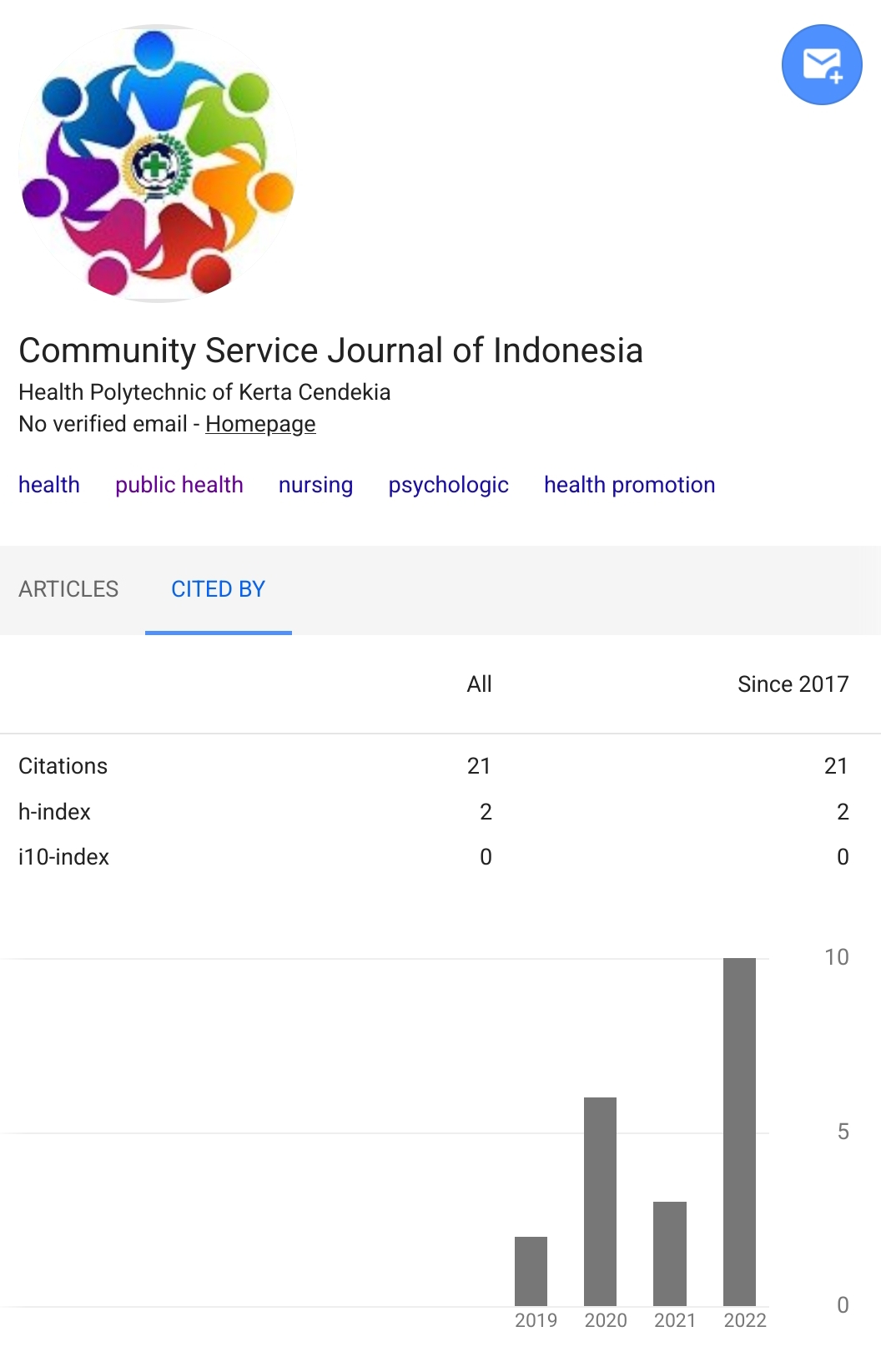COGNITIVE BEHAVIOR THERAPY AS AN EFFORT TO IMPROVE ELDERLY INDEPENCE IN THE COVID-19 PANDEMIC
Abstract
The ongoing Covid 19 pandemic in Indonesia has an impact on psychosocial conditions for everyone. The elderly is a vulnerable group for COVID-19, the elderly experiences a decrease in the ability of body functions both physically and psychologically of a physiological nature. Decreased body function in the elderly is caused by changes in muscle morphology and degenerative diseases, these can cause health problems in the elderly. The implementation of this community service activity aims to teach Cadres and the elderly about Cognitive Behavior Therapy as an effort to increase the independence of the elderly during the COVID-19 pandemic. The method used in this community service activity is to provide training and education health services. This activity was carried out during April-May 2022 which was attended by 12 health cadres and 22 residents in RW 06 Wonokromo Village, Surabaya. The results show that the activity has achieved success according to the success indicators that have been set, namely as many as 12 health cadres were successfully recruited; average attendance is 100%, participants participate in activities enthusiastically, knowledge of cadres after training and residents after counseling increases significantly.References
Y., Lin, X., Hall, J., Xu, H., Xu, J., & Xu, X. (2020). The Effect of Cognitive Behavioral Therapy on Depression, Anxiety, and Stress in Patients With COVID-19: A Randomized Controlled Trial. Frontiers in Psychiatry, 11, 580827. https://doi.org/10.3389/fpsyt.2020.580827 DOI: https://doi.org/10.3389/fpsyt.2020.580827
Mohamadian, F., Bagheri, M., Hashemi, M. S., & Komeili Sani, H. (2018). The Effects of Cognitive Behavioral Therapy on Depression and Anxiety among Patients with Thalassemia: a Randomized Controlled Trial. Journal of Caring Sciences, 7(4), 219–224. https://doi.org/10.15171/jcs.2018.033 DOI: https://doi.org/10.15171/jcs.2018.033
Pujaningsih, N. N., & P Sucitawathi, I. G. A. A. D. (2020). PENERAPAN KEBIJAKAN PEMBATASAN KEGIATAN WABAH COVID-19 DI KOTA DENPASAR. Jurnal MODERAT, 6, 458–470.
Rajkumar, R. P. (2020). COVID-19 and mental health: A review of the existing literature. Asian Journal of Psychiatry, 52, 102066. https://doi.org/10.1016/j.ajp.2020.102066 DOI: https://doi.org/10.1016/j.ajp.2020.102066
Riskesdas, K. (2018). Hasil Utama Riset Kesehata Dasar (RISKESDAS). Journal of Physics A: Mathematical and Theoretical, 44(8), 1–200. https://doi.org/10.1088/1751-8113/44/8/085201 DOI: https://doi.org/10.1088/1751-8113/44/8/085201
Wang, F. (2018). The roles of preventive and curative health care in economic development. PloS One, 13(11), e0206808–e0206808. https://doi.org/10.1371/journal.pone.0206808 DOI: https://doi.org/10.1371/journal.pone.0206808
Copyright (c) 2022 Yanis Kartini, Siti Damawiyah, Bambang Edi Suwito, Imamatul Faizah

This work is licensed under a Creative Commons Attribution-NonCommercial 4.0 International License.
Authors who publish with Community Service Journal of Indonesia agree to the following terms:
- Authors retain copyright licensed under a Creative Commons Attribution-NonCommercial 4.0 (CC BY-NC 4.0), which allows others to remix, tweak, and build upon the authors' work non-commercially, and although the others' new works must also acknowledge the authors and be non-commercial, they don't have to license their derivative works on the same terms.
- Authors are permitted and encouraged to post their work online (e.g., in institutional repositories or on their website) prior to and during the submission process, as it can lead to productive exchanges, as well as earlier and greater citation of published work (See The Effect of Open Access). Authors can archive pre-print and post-print or publisher's version/PDF.













